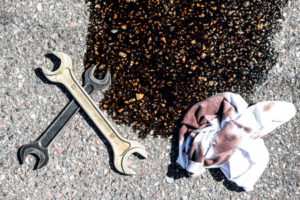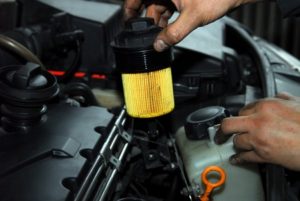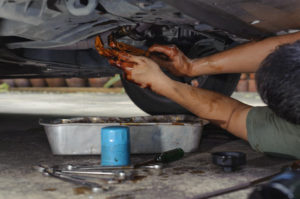When your car is leaking oil, it’s almost like the machine is bleeding. Oil isn’t too dissimilar to blood. Lose enough, and the engine can be severely damaged. Being careless about the oil can end up costing you thousands of dollars in damages, maybe even making a completely new engine necessary.
Oil leaks are caused oftentimes by worn engine gaskets or seals. Depending on the design of your engine, it could also be from an oil line, which transports the liquid from one component to another. The repair involves replacing the defective seal, gasket or line. Sometimes, a leak can signal a bigger problem.
Identifying When Your Car is Leaking Oil
 The big question you always need to be asking is how to tell if you have an oil leak or not. In all honesty, some cars (especially older ones) might burn some oil. Because of that fact, you can’t just judge based on the oil level. But you should be checking the oil at least once a month, if not sooner. On vehicles with a lot of miles, checking the oil every time you fill up the fuel tank is ideal.
The big question you always need to be asking is how to tell if you have an oil leak or not. In all honesty, some cars (especially older ones) might burn some oil. Because of that fact, you can’t just judge based on the oil level. But you should be checking the oil at least once a month, if not sooner. On vehicles with a lot of miles, checking the oil every time you fill up the fuel tank is ideal.
You have an engine oil leak if you find brown, greasy liquid anywhere you’ve parked it. Even a small leak can be a big deal because it could quickly turn into a much larger one. Depending on the design of your engine, it could drop the oil level just low enough to cause problems with certain components. If your vehicle has a turbocharger, the leak could be from the oil line running to the turbo itself, and a small dribble of oil leaking out might cause serious damage to the turbocharger. In other words, ignoring any size oil leak is a bad idea.
Additives and Oil Leaks
There are a number of additives you can put into your car’s oil to repair leaks. You need to be extremely careful of such products, though, because they could have serious negative effects on your vehicle’s performance. Even if the additive doesn’t hurt your engine, it may not repair the leak.
Finding an Oil Leak
Finding an oil leak can be tricky. Just because the oil likes to pool at one point under the car doesn’t mean the oil is coming out at a spot directly above. It’s entirely possible the oil could be hitting other components such as tie rods, running along them for a while, then falling to the ground. This means you have to do some investigative work to figure out the exact location of the leak. Following the trail of motor oil can lead you to the right spot, unless the oil is hitting a hot component like the exhaust manifold and splashing everywhere.
 Sometimes, you may think your car is leaking oil but the problem is actually caused by oil filters that aren’t screwed on all the way. If you change your own oil, always apply some oil to the seal on the filter around the opening, and tighten it as much as possible by hand. If the filter is the source of a leak, you’ll see it’s soaked with oil just by climbing under the car. This is an easy fix.
Sometimes, you may think your car is leaking oil but the problem is actually caused by oil filters that aren’t screwed on all the way. If you change your own oil, always apply some oil to the seal on the filter around the opening, and tighten it as much as possible by hand. If the filter is the source of a leak, you’ll see it’s soaked with oil just by climbing under the car. This is an easy fix.
There’s also the off chance that damage to the oil pan could be the source of a leak. If there’s severe damage, so much oil would be running out you’d probably see the oil pressure warning light before noticing a puddle under the car. A pinhole leak from corrosion, rock damage, etc. might be enough to only leave a small amount of oil under the vehicle. If this is the source, you’ll need to get a new oil pan and swap it out with the old one, which is a pretty straightforward process.
When You’ve Found an Oil Leak
 Once you’ve pinpointed the source of an engine oil leak, you can take steps to replace the faulty part that’s the source. Exactly how you go about this really depends on the component, your mechanical skills/experience and what vehicle you drive.
Once you’ve pinpointed the source of an engine oil leak, you can take steps to replace the faulty part that’s the source. Exactly how you go about this really depends on the component, your mechanical skills/experience and what vehicle you drive.
Many oil lines are fairly easy to replace, but some can be tricky. Most gaskets and seals require some advanced skills to replace, because you’ll need to open up part of the engine and replace everything according to the manufacturer’s specifications, including the amount of torque applied to each bolt.
When You Can’t Find an Oil Leak
If your car is leaking oil, it’s important to find and repair the leak as soon as possible to prevent severe long-term damage. In some cases, however, finding or repairing an engine oil leak is too difficult. If you find yourself in that position, it’s time to hand the car off to a professional.
At T3 Atlanta, our technicians have sophisticated training and specialized methods for tracking down and fixing oil leaks. You’ll love the way you’re treated so much, you’ll actually look forward to coming back.










Leave a Reply
You must be logged in to post a comment.